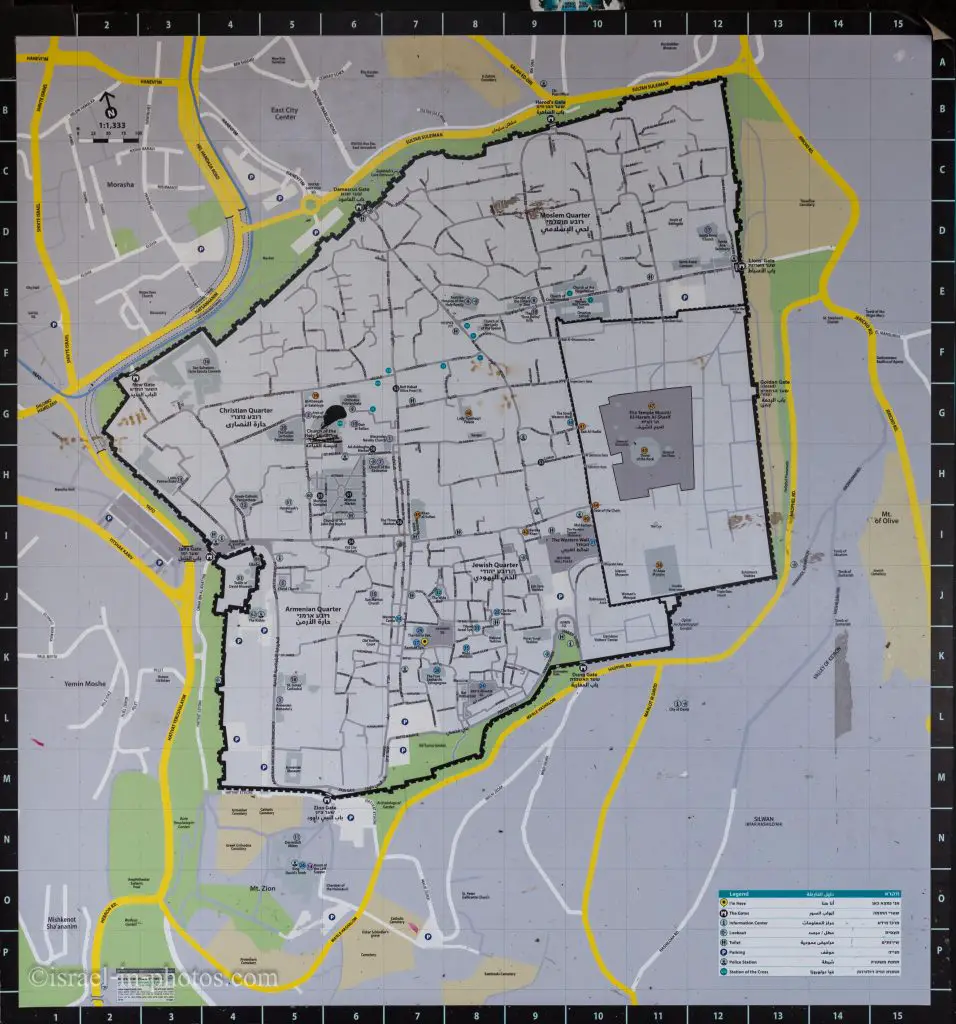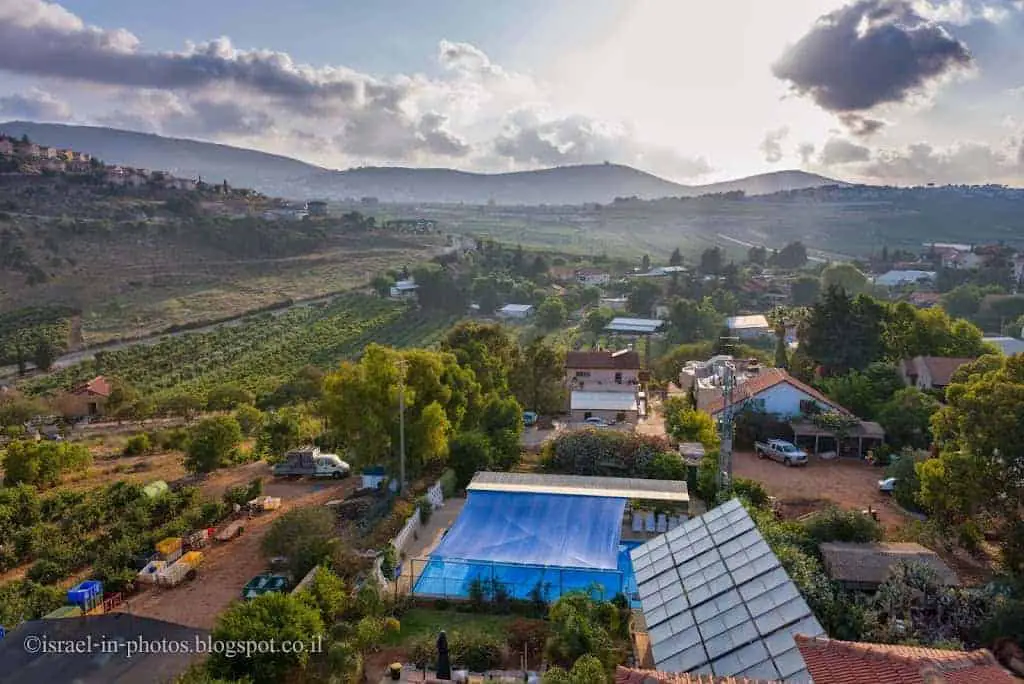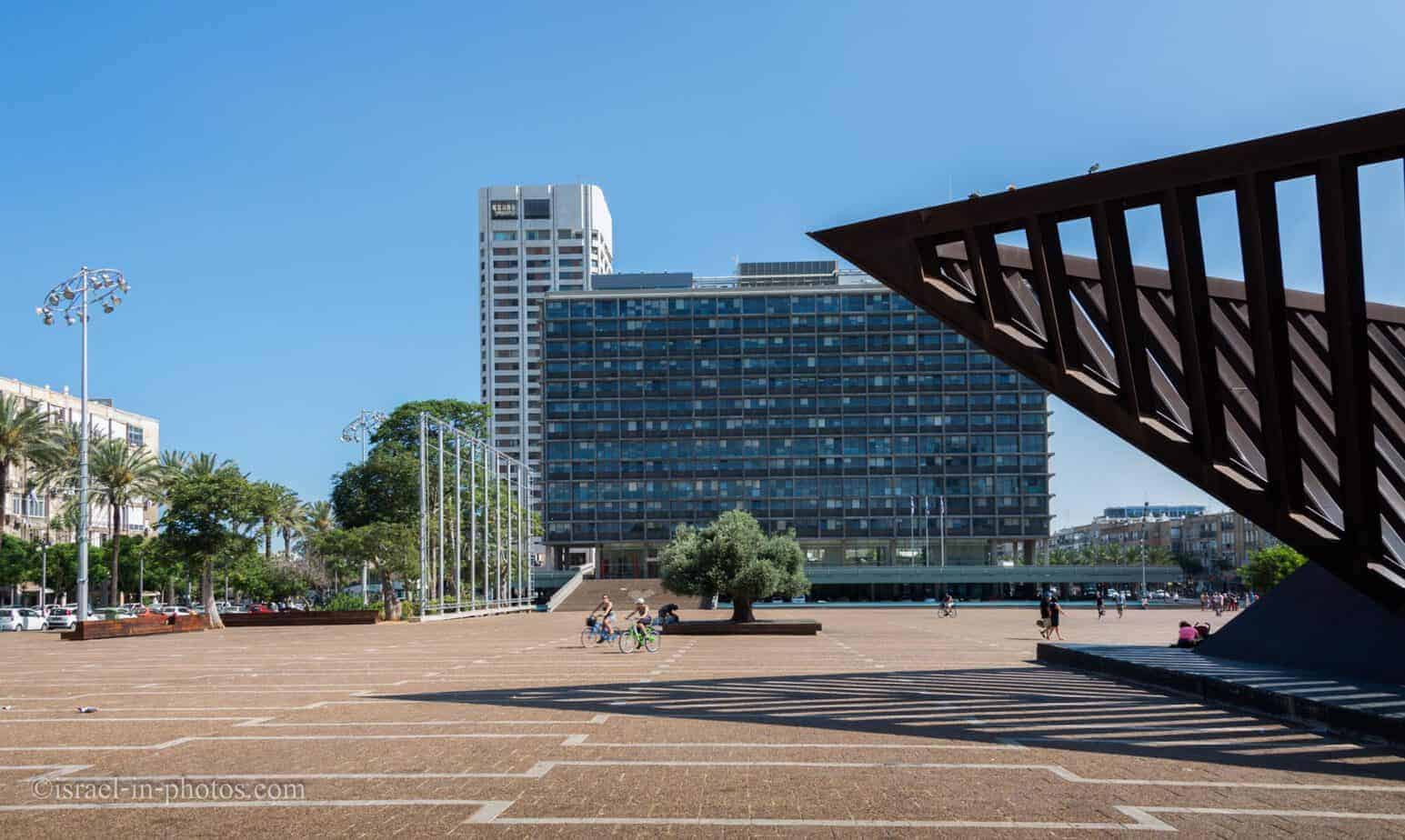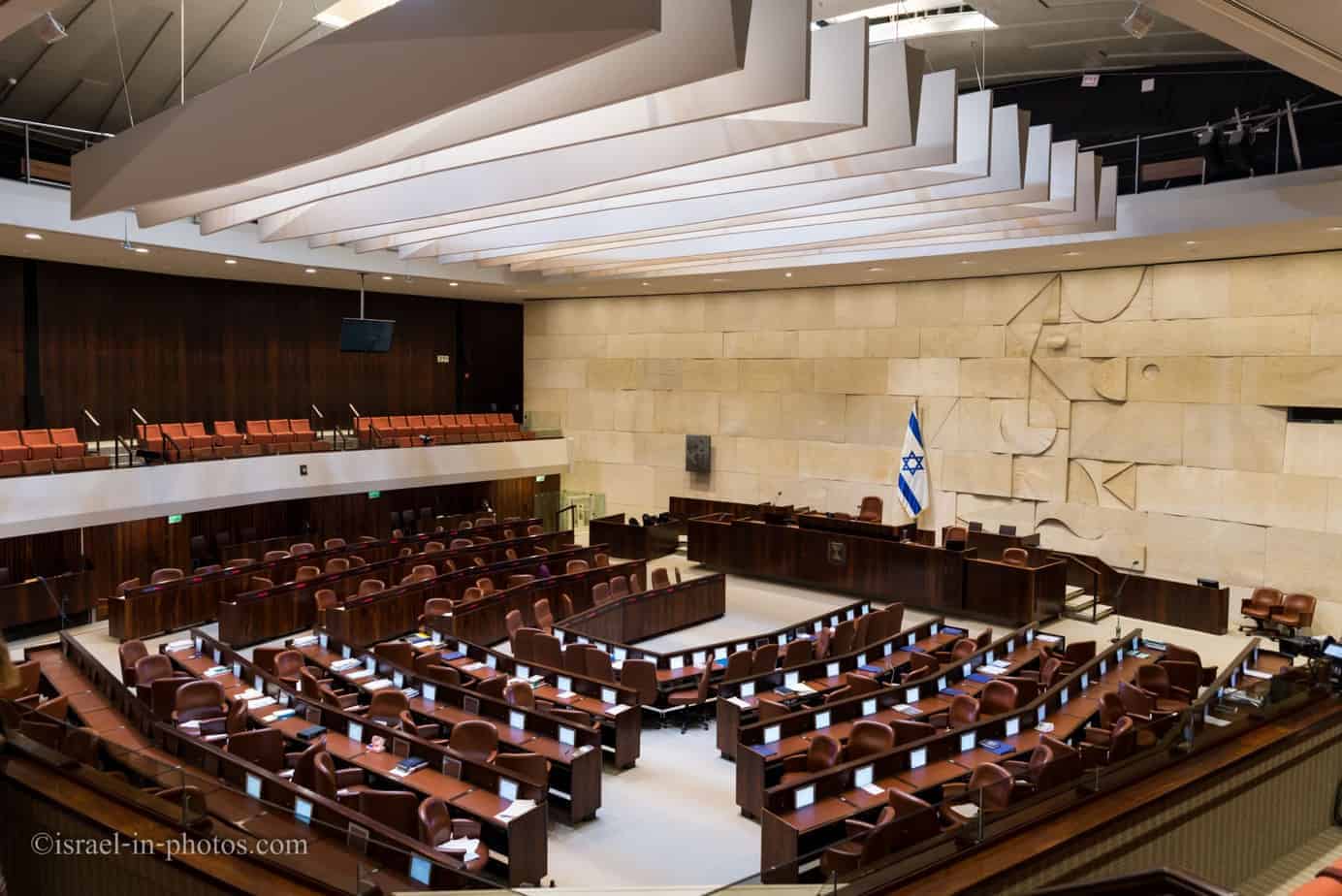Dormition Abbey – Photographed Visitors Guide
According to tradition, Dormition Abbey on Mount Zion stands where the Virgin Mary fell asleep and was taken, body and soul, to heaven.
Note: I took the featured image from the roof of a nearby building. You can find Cenacle, King David’s Tomb, and the Former President’s Room in that building.
Table of Contents
Map
Dormition Abbey is situated on Mount Zion in Jerusalem. It is located to the South of the Old City, and a short walk from Zion Gate will lead you there.
Directions for drivers: Link to Waze and Link to Google Maps
Directions for public transport: Link to Moovit
Interactive map of the area:
You can find the following map in several places in the Old City of Jerusalem.
Note: You can click on the map to enlarge it.
Mount Zion is located at the bottom of the map. And Dormition Abbey is in square N5, marked as #11.
Directions and Parking
For detailed directions, check my guide to the Old City Of Jerusalem.
Entrance Fee
Free.
Opening Hours
Note: in September 2021, major reconstruction was begun in the Dormition – Church and Monastery. At this stage, the church is not accessible. The shop and cafeteria are not in use.
The official site lists the following opening hours:
Sundays: 11:30 – 17:30
Weekdays: 9:00 – 17:30
But during church services, the church is open only to worshipers. And I know this first hand since we were asked to leave at midday during one of our visits. So, when are the masses? There are at 6:00, 7:00, 10:00 only on Sunday, 12:15, 18:15, and 20:00.
Taking the masses into account, the opening hours (that I saw on several other sites) are probably:
Weekdays: 8:30 – 11:45 and 12:30 – 18:00
Saturday: 8:30 – 11:45 and 12:30 – 17:30
Sunday: 10:30 – 11:45 and 12:30 – 17:30
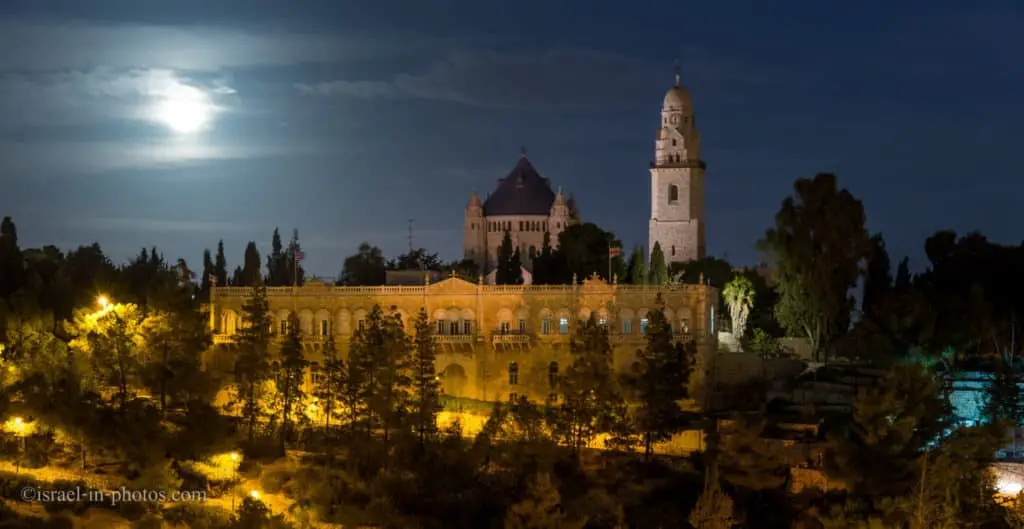
Contact Information
Phone: 02-5655-330
Email: abbey@dormition.net

I took the following photo while standing close to the Room of the Last Supper entrance.
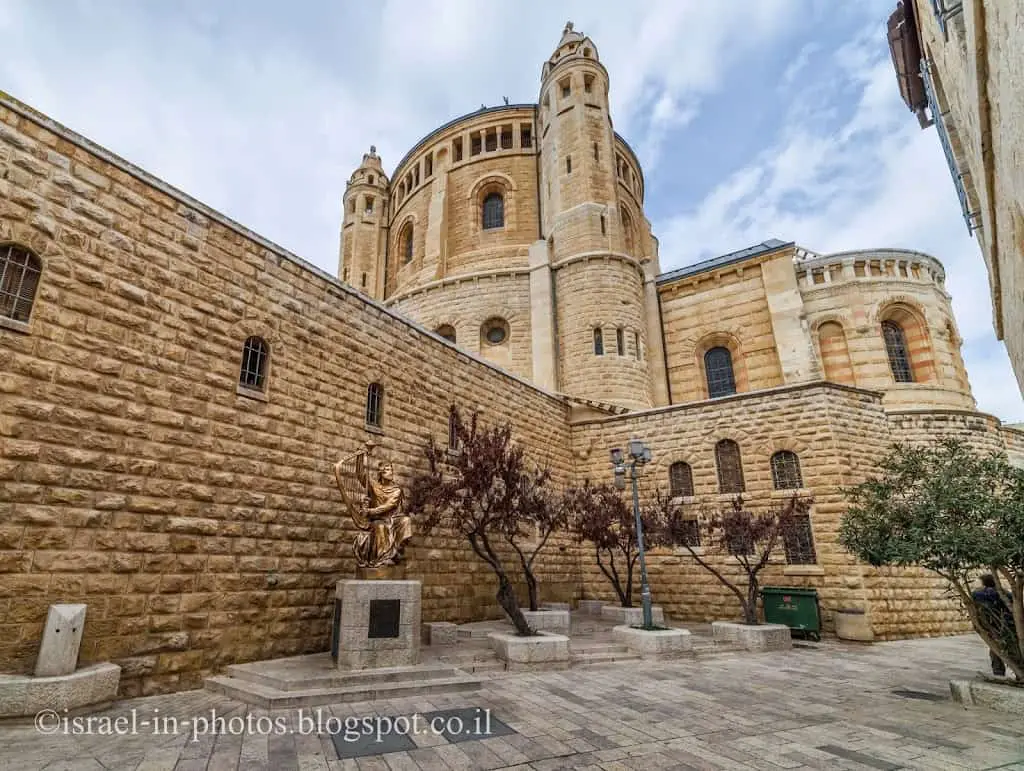
History
Our Dormition Basilica is also relatively young with its barely hundred-year history. But it stands on old stone and oral testimonies of Christian belief. When the room of the Last Supper was lost during the destruction of Jerusalem by the Roman troops in 70 A.D., a Jewish-Christian synagogue was built on Mount Zion, later designated as the “Church of the Apostles.” In the fourth century, it was enlarged to become a small church. At the beginning of the fifth century, a large Byzantine basilica known as “Hagia Sion” was erected in its place. Which, however, was already destroyed during the Persian invasion of 614. Only in the 12th century was a new church built by the crusaders, larger than all its predecessors, and called “Santa Maria in Monte Sion.” However, when the Muslims retook the city from the crusaders in 1187, many traces of the brief Christian period were wiped away. The stone remains of Santa Maria are found today only in the area of the present-day Room of the Last Supper and deep in the ground beneath our monastery and our church.
A the end of the 19th century, when the Germans undertook to acquire the plot of land on Mount Zion, it was still a field of rubble behind which arose the Nebu Daoud (Prophet David) complex.
Source: unless stated otherwise, all quotes were taken from the official site.
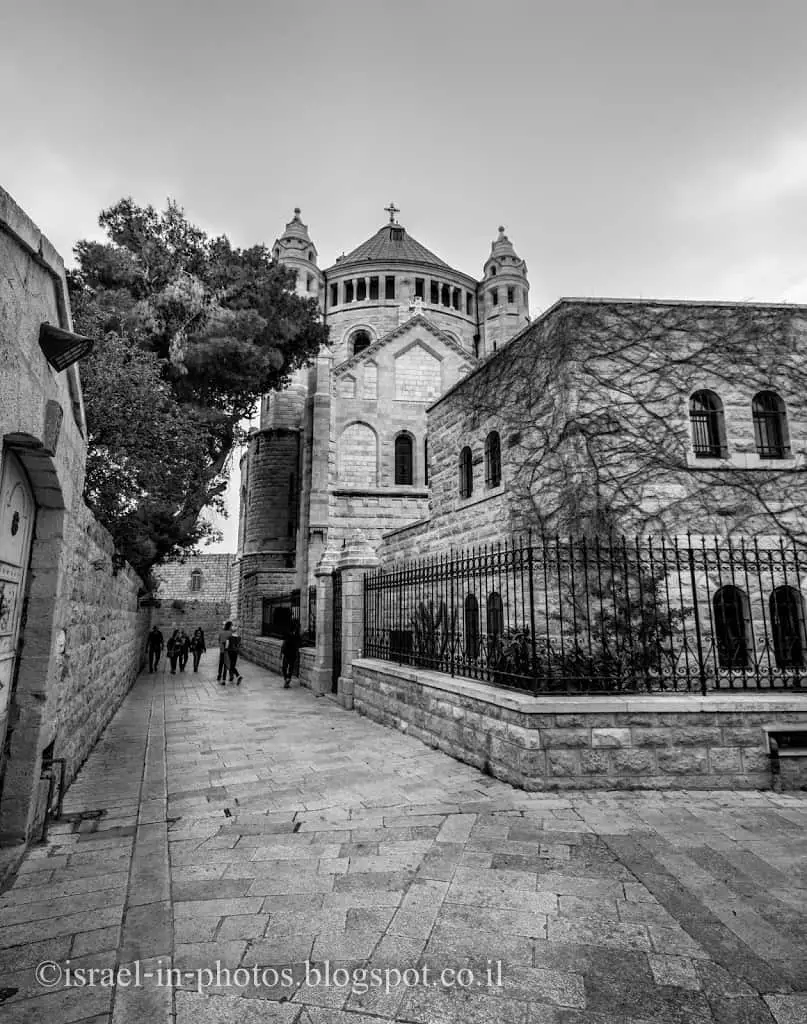
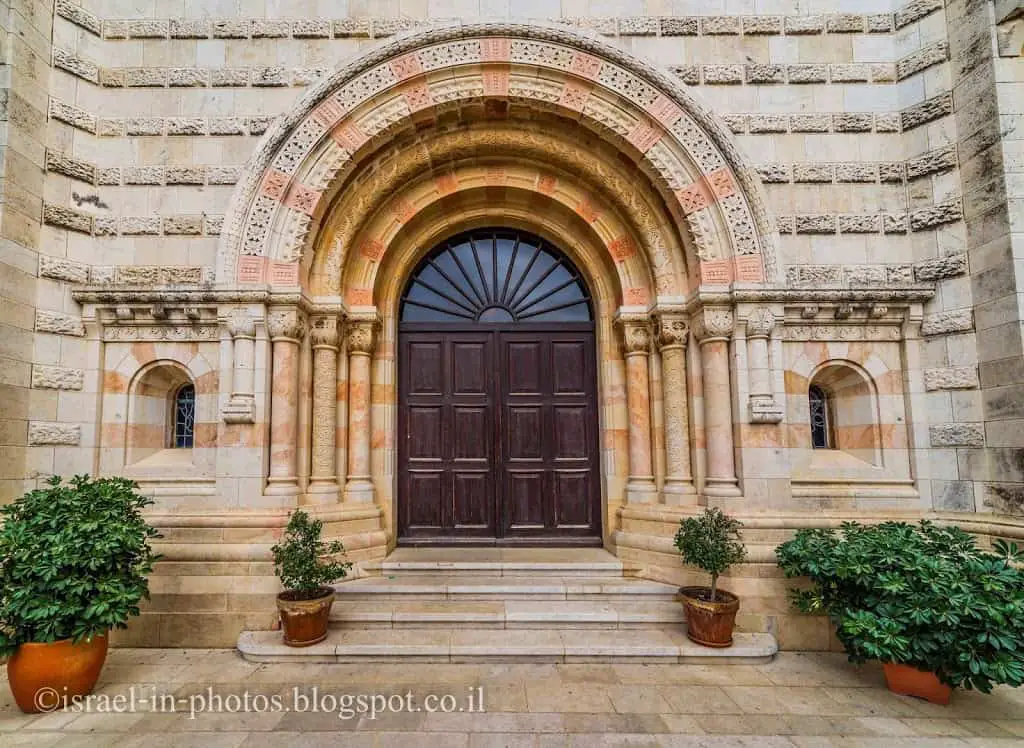
Mosaic Floor
Dormition Abbey has quite a unique architecture. It is a circular building with several niches (containing altars and a choir).
But in this section, I wanted to mention the unexpected zodiac floor mosaics (though it is hard to see them because of the chairs).
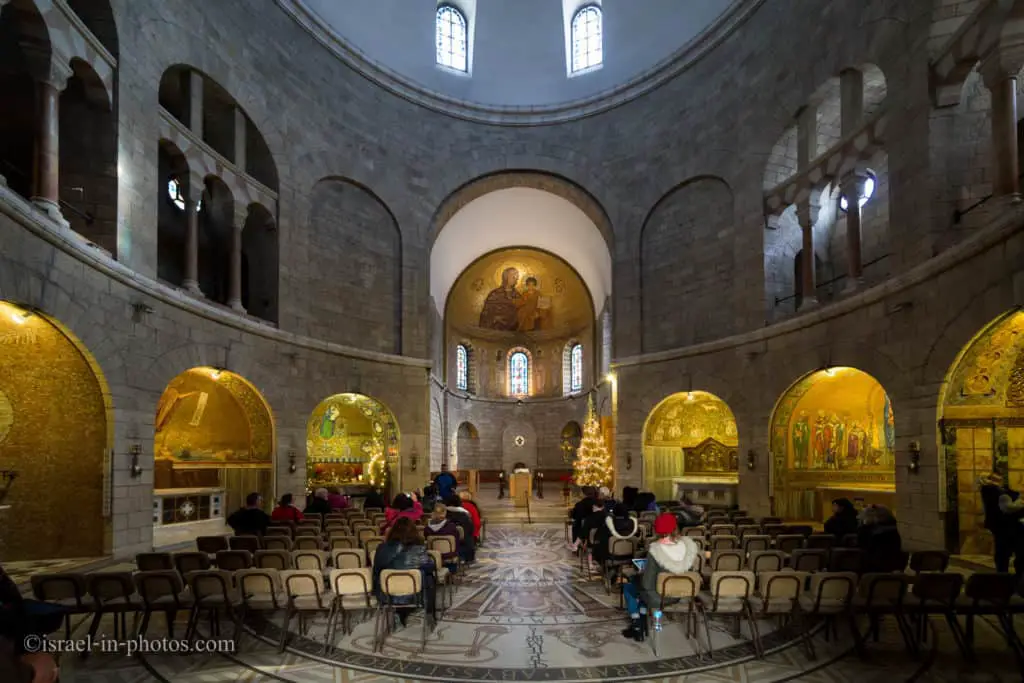
The floor mosaic of the upper church, which our confrere Mauritius Gisler designed and carried out in 1932, can be read as a kind of confession of faith and story of creation:
In the center, three concentric bands mark the center of the creation. The light of the triune God, his truth, and wisdom are carried out into the world by the greater and the lesser prophets and the apostles and evangelists. Additional bands are formed around the center until finally, the ends of the earth are reached – graphically and in letters presented as the names of the twelve months and the twelve signs of the zodiac. The entire circular presentation is surrounded by a quotation from the Book of Proverbs.
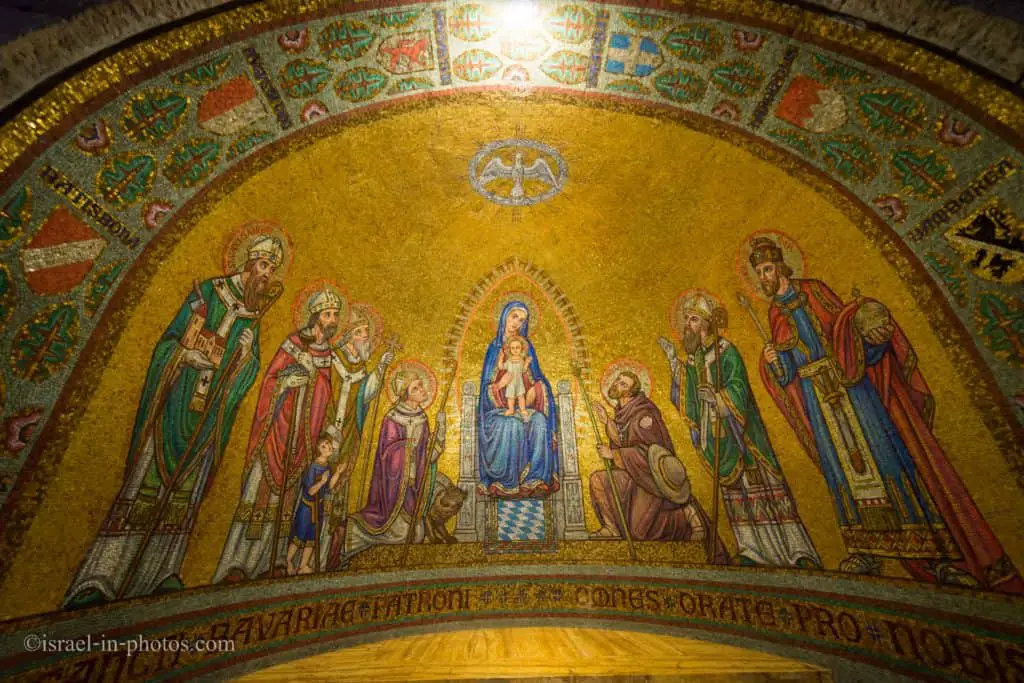
The Crypt
Dormition Abbey has a crypt. You can use the stars at the far end to descend one floor to the crypt. In the crypt of the Basilica, you can find the site where, according to the old Jerusalem tradition, Mary lived and died after the Resurrection of Jesus.
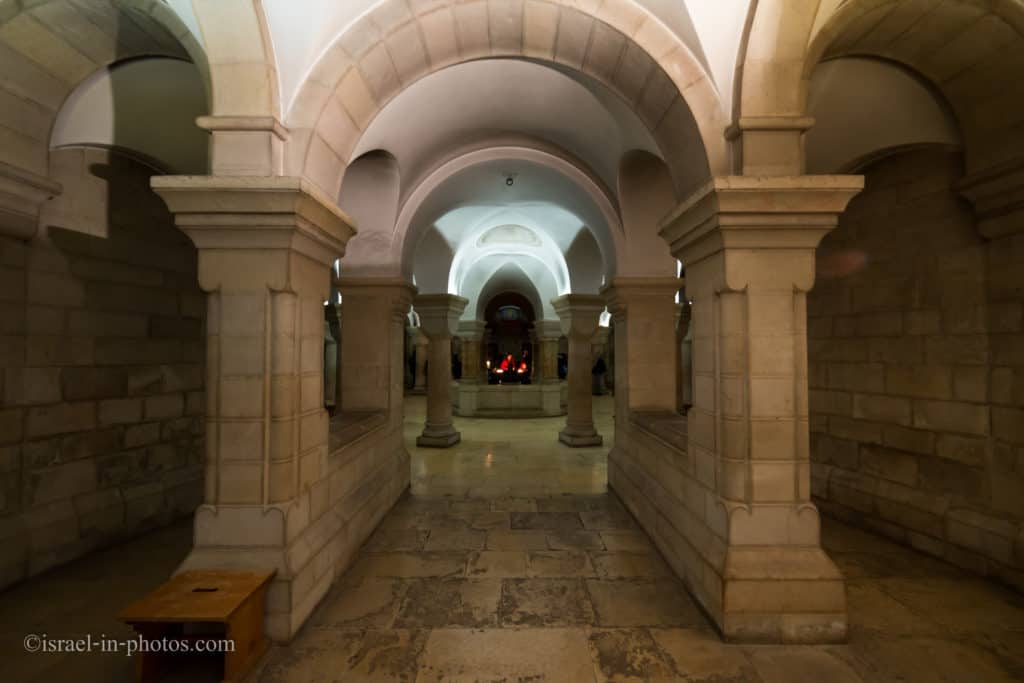
In the center of the crypt, you can find the statue of Mary.
Originally the gown of the figure of Mary was of chased silver and goldplated. After the war of 1948 and the occupation of the church, only the wooden core remained. The ivory hands also had to be replaced and the nose in ivory had to be repaired.
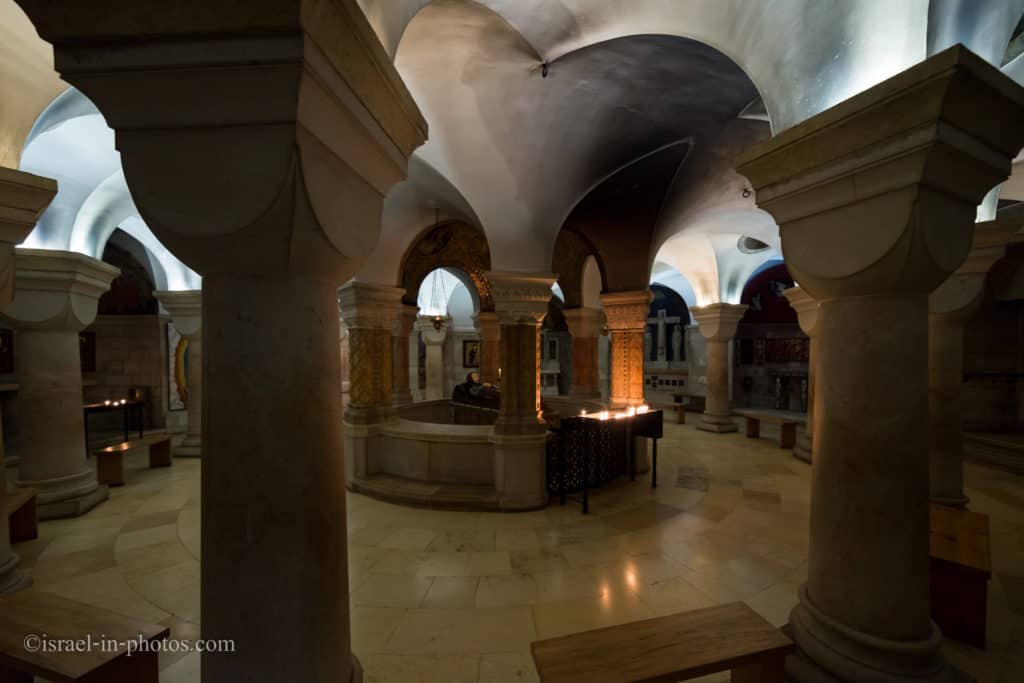
Also, in the crypt, there is the altar to reposition the Blessed Sacrament.
Concerts
During one of our visits, a tour group entered the abbey. Their guide left the group and went upstairs. As it turns out, the guide is also an organ player, and we enjoyed several music pieces.
As you can see from the following fisheye shot (I took it while looking straight up), there is an organ in the back.
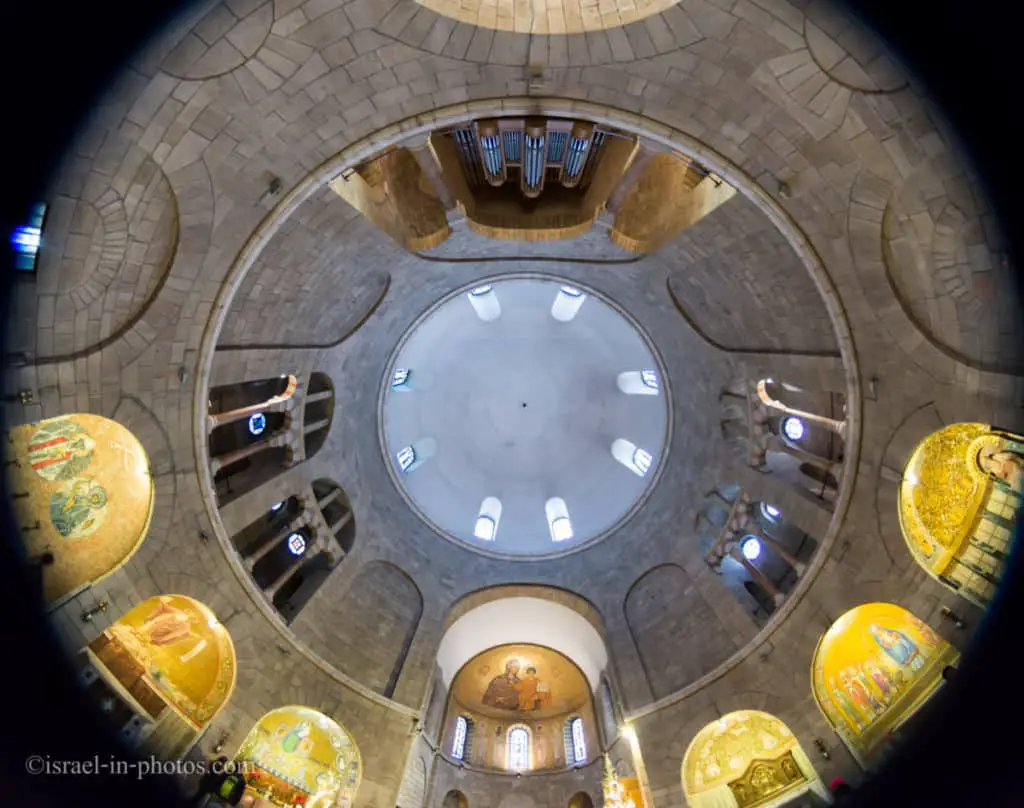
Moreover, the abbey holds different concerts. You can find additional information about the shows either at the official site or the Christian Information Center (which has concert information about many churches).
And the last photo was taken from behind the graveyard (located behind the Room of the Last Supper ).
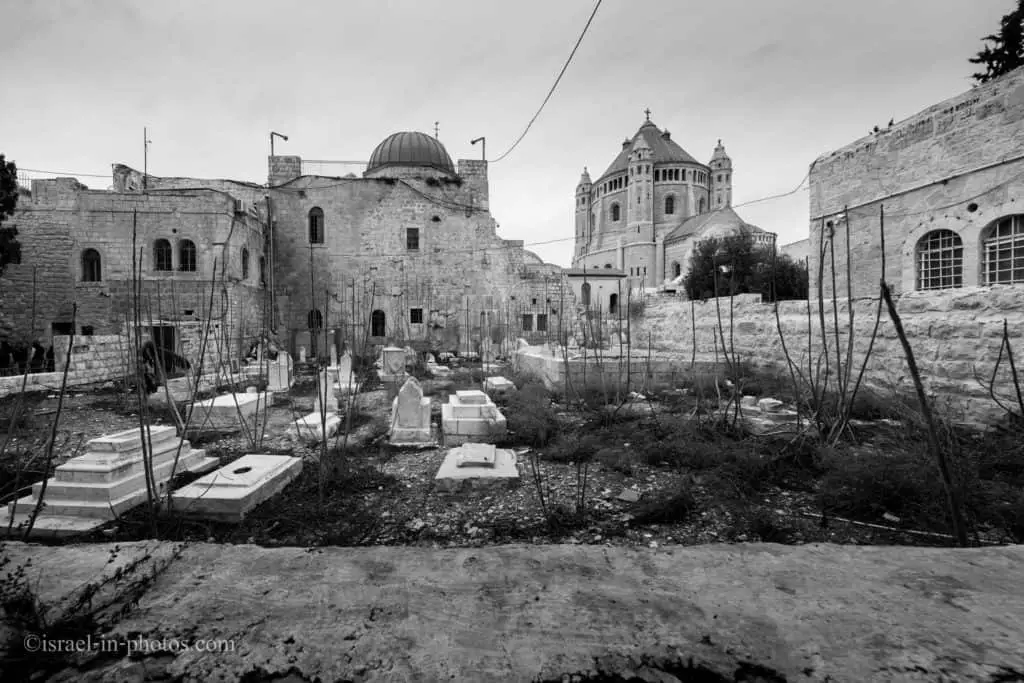
Summary
I suggest visiting Dormition Abbey with other places on Mount Zion and the Old City. And for additional info about the city, see Jerusalem.
Have you ever been to Dormition Abbey? Tell us about your experience in the comments below.
That’s all for today, and I’ll see you in future travels!
Stay Tuned!
Additional Resources
Here are several resources that I created to help travelers:- Trip Planner with Attractions and Itineraries is the page that will help you create your perfect travel route.
- What is the Best Time to visit Israel? To answer this question, we will consider the weather, prices, holidays, festivals, and more.
- Information and Tips for Tourists to Israel will answer the most common questions tourists have about Israel (including safety, passports, weather, currency, tipping, electricity, and much more).
- Israel National Parks and Nature Reserves include a complete list, top ten, map, tickets (Israel Pass, Matmon, combo), and campsites.
- If you are looking for things to do, here are the pages for Jerusalem, Tel Aviv, Haifa, Sea Of Galilee, Akko (Acre), Eilat, Nazareth, Safed (Tzfat), and Makhtesh Ramon.


